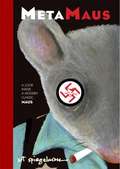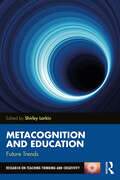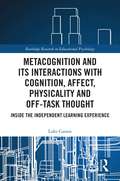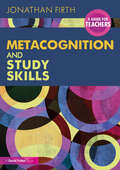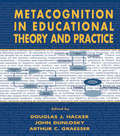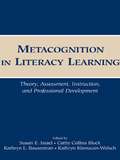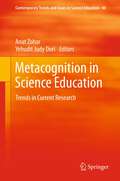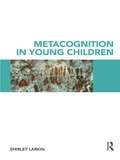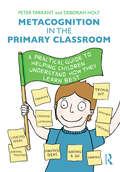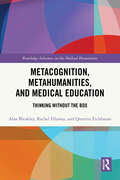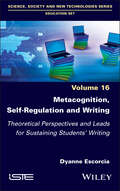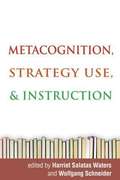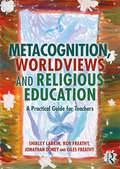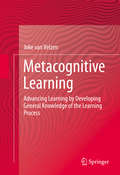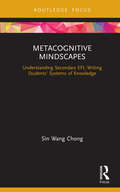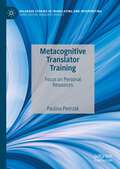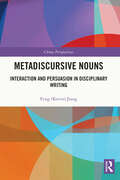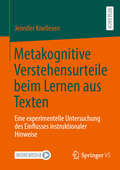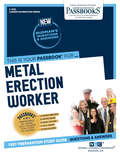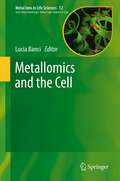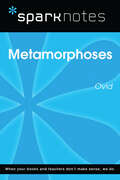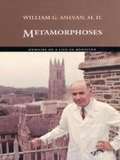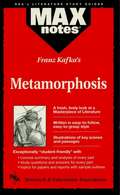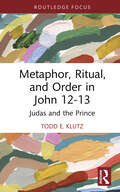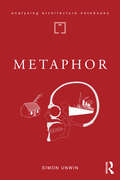- Table View
- List View
MetaMaus: A Look inside a Modern Classic, Maus
by Art SpiegelmanMETAMAUS is built around a series of taped conversations with Hillary Chute. (She is currently Neubauer Family Assistant Professor in the English Department at the University of Chicago and was previously a Junior Fellow in Literature in the Society of Fellows at Harvard University.)
Metacognition and Education: A Practical Guide For Teachers (Research on Teaching Thinking and Creativity)
by Shirley LarkinMetacognition is crucial to education in a changing world. The role of mobile applications, AI and global issues such as climate change make the need for developing learners with the ability to monitor and control their own thinking increasingly necessary. Metacognitive learners are learners who can draw on their own knowledge of their own thinking processes to optimise the conditions under which they learn best. Metacognitive learners are self-regulating and pro-active in motivating themselves to learn new skills. Metacognitive learners are strategic in terms of managing their own resources to get the best from every learning opportunity and to transfer that knowledge to new areas of work. This book is timely in demonstrating how metacognition research is addressing issues of importance in future education. The chapters are authored by an international group of scholars from four continents, who are experts in the field of metacognition and self regulation research. Drawing on their years of experience they look to the future to suggest the future trends in metacognition research. At the same time chapters are rooted in practical application and suggest ways in which the research can be translated into educational environments. The book addresses some new areas of metacognition research such as mind wandering as well as established areas such as teacher metacognition. We are also reminded to consider the social interactions between students and others and the role that relationships play in developing metacognition. Both researchers and educators of all types will find something of interest here. The book sets the trend for future trends in metacognition research.
Metacognition and Its Interactions with Cognition, Affect, Physicality and Off-Task Thought: Inside the Independent Learning Experience (Routledge Research in Educational Psychology)
by Luke CarsonWhat happens when teachers are removed from the equation, when we learn by ourselves or with peers? Increasingly rapid change is part of our world today and tomorrow. The need to learn and to adapt is now lifelong and ubiquitous. But are educators and educational institutions preparing today’s students for this reality? Educators and institutions choose pedagogic models, design curricula and provide instruction. However, this does not mirror the learning environments that we inhabit outside of formal education, nor does it reflect all our learning time during formal education. This text provides a data-driven picture of the independent learning experience – what occurs in the minds of learners as they negotiate learning tasks without (or with less) guidance and instruction. Cognition, distraction, embodied experience, emotion, and metacognition are central to this learning. Drawing on new empirical data, this volume focuses on university-aged learners. These are the learners who have been through our formal educational systems. Do they learn well in independent settings? Have they been prepared for this? Through an explication of this experience, this volume makes a case for how we can better prepare them for the demands of current and future learning.
Metacognition and Study Skills: A Guide for Teachers
by Jonathan FirthPupils often make poor choices when it comes to independent learning because they don’t intuitively understand how to learn. In the classroom too, they typically misjudge how well they understand new concepts, overestimate the accuracy of their own examples and underestimate how much they forget. This book reveals how a metacognitive approach to teaching can help overcome these challenges and support pupils in their learning. This approach can help them in developing the skills to become successful, self-regulated learners.Drawing on key research from cognitive science, this book explores how metacognition works in practice and argues that it is a complex skill best developed over months and years at school. It provides a blueprint for how ‘learning to learn’ alongside ‘quick wins’ that teachers can implement straight away. Chapters cover: • The metacognitive processes that underpin effective learning• Myths about learning, and how pupils’ memory really works• Quick-to-apply classroom strategies for before, during, and after tasks• Different independent study techniques and how to embed them• Developing a culture of metacognitionFull of practical strategies and case studies, this is essential reading for all teachers who want to help their pupils become successful learners in school as well as independent learners for their exam revision and beyond.
Metacognition in Educational Theory and Practice (Educational Psychology Series)
by Arthur C. Graesser John Dunlosky Douglas J. HackerThis volume presents the most current perspectives on the role of metacognition in diverse educationally relevant domains. The purpose is to examine the ways in which theoretical investigations of metacognition have recently produced a strong focus on educational practice. The book is organized around four general themes relevant to education: metacognition and problem solving, metacognition and verbal comprehension, metacognition and the education of nontraditional populations, and metacognition and studentship. Chapter authors review current literature as it applies to their chapter topic; discuss theoretical implications and suggestions for future research; and provide educational applications. Each chapter describes testable theory and provides examples of how theory can be applied to the classroom. The volume will have wide appeal to researchers and students concerned with the scientific investigation of metacognition, and to practitioners concerned with the cultivation of learning and achievement in their students. The unique contribution of this book to the literature on metacognition is its presentation of the most current research examining specific theoretical aspects of metacognition in domains directly relevant to education. This is especially valuable for the many researchers and practitioners who subscribe to the concept that by fostering metacognitive processes during instruction, more durable and transferable learning can be achieved.
Metacognition in Literacy Learning: Theory, Assessment, Instruction, and Professional Development
by Cathy Collins Block Kathryn L. Bauserman Susan E. Israel Kathryn Kinnucan-WelschThis volume provides the first comprehensive, research-based examination of metacognition in literacy learning. Bringing together research findings from reading, linguistics, psychology, and education, it is logically organized as follows: Part I provides the theoretical foundation that supports the teaching of metacognition; Parts II and III provide new methods for metacognitive assessment and instruction in literacy contexts at all grade levels; and Part IV provides new information on integrating metacognition into professional development programs.Key features include:*Chapter Structure. Teacher reflections at the beginning of each chapter illustrate teacher thinking about the chapter topic and metacognitive connections at the end of each chapter link its content with that of the preceding and following chapters.*Contributor Expertise. Few volumes can boast of a more luminous cast of contributing authors (see table of contents).*Comprehensiveness. Twenty chapters organized into four sections plus a summarizing chapter make this the primary reference work in the field of literacy-based metacognition.This volume is appropriate for reading researchers, professional development audiences, and for upper-level undergraduate and graduate level courses in reading and educational psychology.
Metacognition in Science Education
by Anat Zohar Yehudit Judy DoriWhy is metacognition gaining recognition, both in education generally and in science learning in particular? What does metacognition contribute to the theory and practice of science learning? Metacognition in Science Education discusses emerging topics at the intersection of metacognition with the teaching and learning of science concepts, and with higher order thinking more generally. The book provides readers with a background on metacognition and analyses the latest developments in the field. It also gives an account of best-practice methodology. Expanding on the theoretical underpinnings of metacognition, and written by world leaders in metacognitive research, the chapters present cutting-edge studies on how various forms of metacognitive instruction enhance understanding and thinking in science classrooms. The editors strive for conceptual coherency in the various definitions of metacognition that appear in the book, and show that the study of metacognition is not an end in itself. Rather, it is integral to other important constructs, such as self-regulation, literacy, the teaching of thinking strategies, motivation, meta-strategies, conceptual understanding, reflection, and critical thinking. The book testifies to a growing recognition of the potential value of metacognition to science learning. It will motivate science educators in different educational contexts to incorporate this topic into their ongoing research and practice.
Metacognition in Young Children
by Shirley LarkinMetacognition is known to be an important factor in academic achievement; however it is also important in a wider life context. The ability to reflect upon how we are thinking can help us to make wiser decisions in all aspects of our life. This book addresses how metacognition might be fostered in young children. Examining theories of particular relevance to primary school age children the author combines her empirical work over the last 8 years with the work of other researchers to show that children of all ages display metacognitive processing, given the right kind of environment. Drawing on evidence from psychology and education, Metacognition in Young Children brings together international research from different curriculum areas. As well as the traditional areas of science, mathematics and literacy, the author considers metacognition in physical education, art, drama and music. The book argues for a development of metacognition theory, which takes account of wider contextual and political factors. This book includes: Real classroom examples, taking account of the whole child, socio-cultural context and the curriculum Practical examples of developing metacognition across the curriculum Advice on building metacognitive environments in the classroom Development of metacognition theory Essential reading for educational psychology and research students, this book will appeal to trainee and practising teachers with an interest in facilitating young children’s development into wise and thoughtful adults. It offers practical advice supported by theory and evidence.
Metacognition in the Primary Classroom: A practical guide to helping children understand how they learn best
by Peter Tarrant Deborah HoltCurrent trends in education suggest that pupils should have more responsibility for their own learning, but how can they if they don’t understand the what, the why and the how? This practical guide explores the idea that a metacognitive approach enables pupils to develop skills for lifelong learning. If pupils can identify the what, the why, and the how of their learning, they can begin to formulate strategies for overcoming challenges and for continuous improvement. In this book, the authors truly engage with research into the link between metacognition and learning, and the idea that if you can effectively articulate your thoughts and strategies regarding how you learn, you might then be in a better position to take actions in order to improve and to be able to learn best. An appendix of useful resources is also included, which offers a range of activities surrounding the language of learning, reflection and metacognition, as well essential advice on how to develop metacognition in the early years (4-8), middle years (8-10), and upper years (10-13).Metacognition in the Primary Classroom demonstrates how important it is for children to be well-enough informed to play an active role in learning better. Having the language skills to talk about your learning, and the opportunity to share ideas and strategies with others, enables all concerned to explore and develop approaches in order to learn better. This book is a crucial read for anyone interested in ensuring that pupils take an active role in their own learning.
Metacognition, Metahumanities, and Medical Education: Thinking Without the Box (ISSN)
by Alan Bleakley Quentin Eichbaum Rachel EllawayThis persuasive volume develops a novel approach to medical education and the medical humanities, making a case for the integration of the two to explore the ways in which ‘warm’ humanism and ‘cold’ technologies can come together to design humane posthumanist futures in medicine.There are many problems with conventional medical education. It can be overly technocratic, dehumanizing, and empathy-eroding, introducing artefacts that lead to harm and reproduce inequality and injustice. Use of the arts, humanities, and qualitative social sciences have been pursued as an antidote or balance to these problems. Arguing against the purely instrumentalist use of medical humanities in this way, this book addresses the importance of a genuine and open-ended engagement with humanities approaches in medicine. It discusses the impact of artificial intelligence and emerging theoretical frameworks and posthumanist perspectives, such as object-oriented ontology, on meaning making in medicine. It demonstrates how the key to such a transition is the recovery of the intrinsic art and humanity of metaphor-heavy biomedical science, in turn framed by models of dynamic complexity rather than static linearity.This book is an important contribution to debates around the medical humanities and its role in medical education. It is an essential read for scholars with an interest in these areas, as well as those working in science and technology studies and the sociology of health and illness.
Metacognition, Self-Regulation and Writing: Theoretical Perspectives and Leads for Sustaining Students' Writing
by Dyanne EscorciaStudents' difficulties in producing texts that meet the requirements of academic writing are a recurring concern for teaching staff and those responsible for university courses. Various initiatives are currently being taken, mainly at undergraduate level, to help students improve the quality of their writing. Research into metacognitive processes and the self-regulation of learning can be used to support the design of these writing support systems, particularly by providing a better understanding of the students' difficulties. This book reviews the concepts of metacognition and self-regulation in relation to writing processes. It analyses the metacognitive components involved in text production, their links with successful writing and their individual and contextual determinants. It completes this analysis by drawing on the teaching and assessment of writing in higher education. All of these elements are articulated around a multifactorial modeling of the learning and teaching of academic writing.
Metacognition, Strategy Use, and Instruction
by Harriet Waters Wolfgang SchneiderShowcasing exemplary research programs, this book explores how the latest theories and findings on cognitive development can be used to improve classroom instruction. The focus is on how children acquire knowledge about the processes involved in learning such as remembering, thinking, and problem solving as well as strategies for mastering new information. The contributors are leading experts who illustrate ways teachers can support the development of metacognition and goal-directed strategy use throughout the school years and in different academic domains. Teacher behaviors and instructional methods that promote these abilities are identified, and innovative assessment approaches and research designs are described.
Metacognition, Worldviews and Religious Education: A Practical Guide for Teachers
by Shirley Larkin Rob Freathy Jonathan Doney Giles FreathyReligious Education (RE) holds a unique place within the state education system. Yet, the teaching of RE has often been criticised for its tendency to present simplified and stereotypical representations of religions. Bringing together the theory of metacognition with RE curriculum content, this book offers a coherent and theoretically supported approach to RE and beyond that is applicable to a range of subjects and students of various age groups. Metacognition, Worldviews and Religious Education seeks to support teachers in creating a new and exciting classroom approach. With a focus on putting children and teachers’ worldviews back on the RE agenda and developing awareness of these through metacognitive processes, it includes • Tables, frameworks and checklists to make it easy for teachers to adapt the approach to their own context • Concrete examples of how the approach can work in the classroom, including case studies from teachers • Call-out boxes for teachers and others to reflect on their own practice and to consider their own beliefs and values in relation to teaching and learning Co-authored by three researchers from Exeter University and one experienced advanced skills RE primary school teacher, this book explains in a jargon-free way the theories of metacognition and worldviews which underpin the creation of a unique learning environment, making it an essential read for students, experienced teachers, researchers in RE and anyone interested in taking a thinking skills approach to pedagogy.
Metacognitive Learning
by Joke Van VelzenIn this book, the educational theory of metacognitive learning and its instructional implications are used to describe and illustrate how learners can become effective or self-directive learners. First, three levels of general knowledge of the learning process are discussed in this book through an overview of research studies. The book then describes how learners can develop along these levels and learn to effectively plan their learning. This book includes study and educational material centered on the learning and instruction of general knowledge of the learning process.
Metacognitive Mindscapes: Understanding Secondary EFL Writing Students' Systems of Knowledge
by Sin Wang ChongSynthesizing research on metacognition and intersecting it with studies on second and foreign language writing, Sin Wang Chong puts forward a conceptual framework of metacognition and metacognitive knowledge that is employed as an analytical lens to examine junior secondary EFL students’ writing proficiencies. The exploration takes into account three facets of metacognitive knowledge, namely person knowledge, task knowledge, and strategic knowledge. Based on data garnered from interviews, open-ended questionnaires, and think-aloud sessions with students, the book analyzes the three types of metacognitive knowledge – theorized as a system – of junior secondary students with high, average, and low writing proficiencies. Discussion of the findings offers an expanded understanding of the factors that potentially affect students’ writing proficiencies, which will inform the teaching of primary and secondary EFL writing teachers to be more learner-centered. The book will appeal to researchers and teachers interested in metacognition and metacognitive knowledge.
Metacognitive Translator Training: Focus on Personal Resources (Palgrave Studies in Translating and Interpreting)
by Paulina PietrzakThis book explores new developments and objectives in translator education, with a focus on metacognitive aspects of both translating and learning to become a translator. The author reports on an exploratory study on translation graduates with particular attention to the effects of metacognitive awareness on their professional development. The data collected show that, despite the growing demand on translation services and advancement of translation technology, there are still a great number of translation graduates who decide not to become professional translators. The findings show a number of reasons why they choose different career paths and discuss the correlations between their self-concept and their professional development, as reflected in their academic performance, career choice, career paths, job satisfaction and perceived success. The book will appeal to teachers, trainers and academics in the field of translation studies, and more specifically translation as a profession and translator competence.
Metadiscursive Nouns: Interaction and Persuasion in Disciplinary Writing (China Perspectives)
by Feng (Kevin) JiangBased on a 1.7-million-word corpus of 160 research articles from both soft and hard knowledge fields, this book sets out to explore how a particular type of noun, namely, metadiscursive nouns are rhetorically used to mediate writer-reader interaction in disciplinary writing. Analysts of academic discourse have come to regard hedges, reporting verbs, directives and so on as forming part of a wide repertoire of interactive features available to authors, suggesting a variety of terms, including evaluation, stance, appraisal and metadiscourse. One aspect which has been less fully explored, however, is the rhetorical role nouns play in achieving writers’ persuasive goals. This book fills the gap by proposing a particular type of nouns as metadiscursive nouns (as in ‘this supports our hypotheses that youth are more likely to co-offend when neighborhoods are less disadvantaged’). The author aims to find out how writers employ metadiscursive nouns to engage and interact with readers in academic prose, raising theoretical and pedagogical implications and how they can be applied in the teaching of academic writing. This book will be of particular interest to students and scholars working in the areas of English for Academic Purposes, Corpus studies, Academic writing, and Linguistics in general.
Metakognitive Verstehensurteile beim Lernen aus Texten: Eine experimentelle Untersuchung des Einflusses instruktionaler Hinweise
by Jennifer KnellesenJennifer Knellesen untersucht in diesem Buch, ob instruktionale Hinweise über die Testanforderungen die Urteilsgenauigkeit von Lehramtsstudierenden beim Lernen aus Texten verbessern können. Ausgangspunkt ist, dass Studierende oft dazu neigen, ihr Verständnis zu überschätzen, was auf die Diskrepanz zwischen genutzten Hinweisen (Cues) und den kognitiven Anforderungen der Testfragen zurückgeführt werden kann. Instruktionale Hinweise sollen helfen, diagnostischere Cues zu nutzen und somit die Genauigkeit des Verstehensurteils zu erhöhen. In zwei randomisierten Experimenten mit Lehramtsstudierenden wurde der Einfluss verschiedener Leseinstruktionen auf die Urteilsverzerrung untersucht. Die Ergebnisse zeigen, dass Anwendungsinstruktionen zwar zu einem elaborierteren Leseprozess führten, jedoch ohne weitere Unterstützung nicht ausreichten, um die Überschätzung des Verständnisses signifikant zu reduzieren. Zudem weisen die Studien darauf hin, dass die Eigenschaften der Texte die Wirkung von instruktionalen Hinweisen beeinflussen können. Die Arbeit liefert damit wichtige Erkenntnisse für die Gestaltung effektiver Lernmaterialien im Hochschulkontext.
Metal Erection Worker: Passbooks Study Guide (Career Examination Series)
by National Learning CorporationThe Metal Erection Worker Passbook® prepares you for your test by allowing you to take practice exams in the subjects you need to study. It provides hundreds of questions and answers in the areas that will likely be covered on your upcoming exam.
Metallomics and the Cell
by Lucia BanciMetallomics and the Cell provides in an authoritative and timely manner in 16 stimulating chapters, written by 37 internationally recognized experts from 9 nations, and supported by more than 3000 references, several tables, and 110 illustrations, mostly in color, a most up-to-date view of the "metallomes" which, as defined in the "omics" world, describe the entire set of biomolecules that interact with or are affected by each metal ion. The most relevant tools for visualizing metal ions in the cell and the most suitable bioinformatic tools for browsing genomes to identify metal-binding proteins are also presented. Thus, MILS-12 is of relevance for structural and systems biology, inorganic biological chemistry, genetics, medicine, diagnostics, as well as teaching, etc.
Metamorphoses (SparkNotes Literature Guide Series)
by SparkNotesMetamorphoses (SparkNotes Literature Guide) by Ovid Making the reading experience fun Created by Harvard students for students everywhere, SparkNotes is a new breed of study guide: smarter, better, faster. Geared to what today's students need to know, SparkNotes provides: *Chapter-by-chapter analysis *Explanations of key themes, motifs, and symbols *A review quiz and essay topicsLively and accessible, these guides are perfect for late-night studying and writing papers
Metamorphoses: Memoirs of a Life in Medicine
by William G. AnlyanWilliam G. Anlyan, a dedicated doctor and gifted administrator, was a leader in the transformation of Duke University Hospital from a regional medical center into one of America's foremost biomedical research and educational institutions. Anlyan's fifty-five-year career at Duke University spanned a period of extraordinary change in the practice of medicine. He chronicles those transformations--and his role in them--in this forthright memoir.Born in Alexandria, Egypt, in 1925, and schooled in the British tradition, Anlyan attended Yale University as an undergraduate and medical student before coming to the relatively unknown medical school at Duke University in 1949 for an internship in general and thoracic surgery. He stayed on, first as a resident, then as a staff surgeon. By 1961, he was a full professor of surgery. In 1964, Anlyan was named dean of the medical school, the first in a series of administrative posts at the medical school and hospital. Anlyan's role in the transformation of the Duke University Medical Center into an internationally renowned health system is manifest: he restructured the medical school and hospital and supervised the addition of almost four million square feet of new or renovated space. He hired outstanding administrators and directed a staff that instituted innovative programs and groundbreaking research centers, such as the Cancer Center and the Physician's Assistant Program.Anlyan describes a series of metamorphoses in his own life, in the world of medicine, in Durham, and at Duke. At the time of his prep school upbringing in Egypt, medicine was a matter of controlling infectious diseases like tuberculosis and polio. As he became an immigrant medical student and then a young surgeon, he observed vast advances in medical practice and changes in the financing of medical care. During his tenure at Duke, Durham was transformed from a sleepy mill and tobacco town into the "City of Medicine," a place where patients routinely travel for open-heart surgery and cutting-edge treatments for cancer and other diseases.Anyone interested in health care, medical education, and the history of Duke University will find Anlyan's memoir of interest.
Metamorphosis (MAXNotes Literature Guides)
by Stanley TaikeffMAXnotes offer a fresh look at masterpieces of literature, presented in a lively and interesting fashion. Written by literary experts who currently teach the subject, MAXnotes will enhance your understanding and enjoyment of the work. MAXnotes are designed to stimulate independent thought about the literary work by raising various issues and thought-provoking ideas and questions. MAXnotes cover the essentials of what one should know about each work, including an overall summary, character lists, an explanation and discussion of the plot, the work's historical context, illustrations to convey the mood of the work, and a biography of the author. Each chapter is individually summarized and analyzed, and has study questions and answers.
Metaphor, Ritual, and Order in John 12-13: Judas and the Prince (Routledge Interdisciplinary Perspectives on Biblical Criticism)
by Todd E. KlutzThis book offers new interpretative insight into the Gospel of John, applying a combination of critical discourse analysis, conceptual metaphor theory, and anthropological theories of ritual. Specifically it explores the meaning of the statement “Now the ruler of this world will be driven out” in John 12:31 and defends a widely overlooked alternative reading. The author proposes a prophecy-fulfilment scheme whereby this predictive utterance by Jesus’ is subsequently implied as fulfilled in the departure of the satanically-possessed Judas’ from the circle of Jesus’ disciples at the Last Supper in John 13:30. Addressing several major strands relating to purity, exorcism, and group identity, the analysis provides an important entry-point for a fresh examination of the Fourth Gospel as a whole. The book represents a significant contribution to Johannine scholarship and to New Testament studies and will be of interest to scholars of religion, theology and biblical studies.
Metaphor: an exploration of the metaphorical dimensions and potential of architecture (Analysing Architecture Notebooks)
by Simon UnwinEach of these Analysing Architecture Notebooks is devoted to a particular theme in understanding the rich and varied workings of architecture. They can be thought of as addenda to the foundation volume Analysing Architecture, which first appeared in 1997 and has subsequently been enlarged in three further editions. Examining these extra themes as a series of Notebooks, rather than as additional chapters in future editions, allows greater space for more detailed exploration of a wider variety of examples, whilst avoiding the risk of the original book becoming unwieldy. Metaphor is the most powerful component of the poetry of architecture. It has been a significant factor in architecture since the earliest periods of human history, when people were finding ways to give order and meaning to the world in which we live. It is arguable that architecture began with the realisation of metaphor in physical form, and that subsequent movements – from Greek to Gothic, Renaissance to Modern, Victorian to Vernacular… – have all been driven by the emergence or rediscovery of different metaphors by which architecture might be generated.
